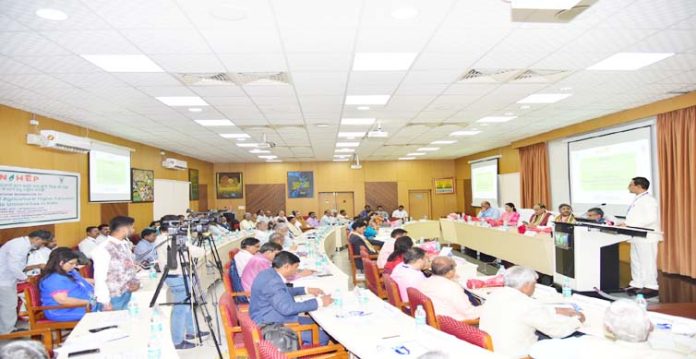The ICAR- National Academy of Agricultural Research Management, Hyderabad under the aegis of National Agricultural Higher Education Project (NAHEP) has organized a “National Symposium” themed ‘Mainstreaming of Agricultural Higher Education in Private Universities of India’ on Thursday at NAARM Rajendranagar.
The symposium aimed at discussing various issues pertaining to quality higher agricultural education and governance besides mainstreaming of private education.
During the colloquium, deliberations were made over four major themes that include 1) Equal opportunity in education and employment, 2) Quality assurance in agricultural education, 3) Enabling an environment for quality education and 4) Accreditation in the context of new education policy.
While addressing the Symposium as Chief Guest, Dr.R.C.Agrawal, Deputy Director General (Edn), ICAR and National Director (NAHEP), New Delhi, said, “It was mandated to fulfill human demand of agricultural graduates by 2030 for which there should be sharing of resources between public-private through MoUs and ICAR will play a role of facilitator to bridge the gap.” He also urged that teachers should work to ensure that the horizon of thinking, learning and knowledge-base should be enhanced.
“There are many challenges in increasing the number of students, providing accommodation and resources. Hope that we can come with a solution through public-private partnerships. As such there are plans to increase the number of current diploma courses and vocational courses in agricultural education,” he maintained.
Guest of Honour Prof. Raghuvir Singh, Vice Chancellor, Teerthanker Mahaveer University, Moradabad, Uttar Pradesh, reminded that the role of agricultural education is to prepare students ready for real life challenges. “The primary task of the teachers is to ratchet-up students’ interest in the classroom. The philosophy should be to ensure students’ involvement in learning and encouraging the students’ creativity, he argued.
Kunwar Shekhar Vijendra, Chancellor, Shobhit University, Uttar Pradesh, another Guest of Honour at the meet, shed a light over the primary purpose of education and classified it into three segments such as creation of knowledge, integration of Knowledge and application of knowledge. “Creation of knowledge happens when we join hands and resources. The purposes can be fulfilled when we join hands and make resources available to each other. Currently the optimum utilization of resources is only 30% in institutions, by sharing the resources we can increase the efficiency of resources,” he explained.


